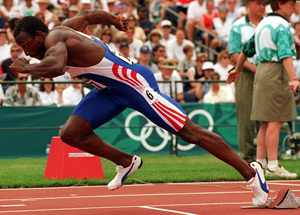On Friday, we took a look at the toll that Optimism (or lack thereof) takes on health. For those of you who want to apply this to business, the research on Optimism and Sports may be a better transfer of principles:
“Sports enthusiasts at every level are intuitively aware that the ‘mental’ part of performance can be just as important as the physical. Gymnastics is often said to be 90% mental and 10% physical. Other sports see ‘intangible’ factors, such as confidence and a ‘cool’ head under pressure, make up more than 50% of success.

Many will talk about ‘being in the zone’ when they perform at their peak. Olympic 100- metre gold medalist Linford Christie described his focus on the starting line as being like looking down a long, straight tune. His ability to blank out other competitors, the roar of the crowd, the flashbulbs, gave him those extra centimeters over his rivals.
In sport, psychology matters – and at every level. If you go onto the squash court telling yourself that you’ve never beaten Joe before and that you’re not going to beat him today, then the result is very predictable.
Optimism boosts sporting performance, both at team and individual levels. Research into baseball and basketball teams in the USA revealed that teams have their own explanatory styles. The explanatory style used by teams after a defeat or when under pressure in the last few minutes of a game will determine future performance, regardless of the quality of the team. Those who are optimistic in the face of defeat are more likely to be successful in their next game; those who explain setbacks negatively will perform more poorly. Research into swimmers revealed that the same trend holds for individual athletes. Quite simply, when under pressure optimistic sportsmen and women try harder – and they recover from defeat more quickly.
After conducting detail study of sports teams and on individual swimmers, Martin Seligman included a list of ‘What Every Coach Should Know’ in Learned Optimism: _
Optimism is not something you can know intuitively. The ASQ (an optimism test developed by Seligman’s team) measures something you can’t. It predicts success beyond experienced coaches’ judgments and handicappers’ expertise.
- Optimism tells you when to use certain players rather than others. Consider a crucial relay race. You have a fast athlete, but he’s a pessimist who lost his last individual race. Substitute. Use pessimists only after they have done well.
- Optimism tells you who to select and recruit. If two prospects are close in raw talent, recruit the optimist. He’ll do better in the long run.
- You can train your pessimists to become optimists.”
If you’re interested, you and your team can go to http://www.authentichappiness.sas.upenn.edu/Default.aspx and take the Optimism Test to see where you rank. But keep in mind…your entire team can’t be optimists. Decisions would be far too impulsive.

